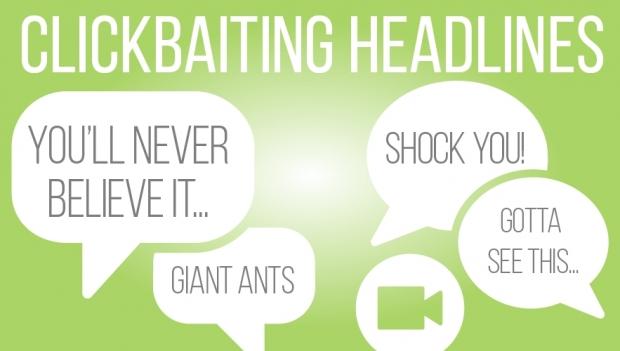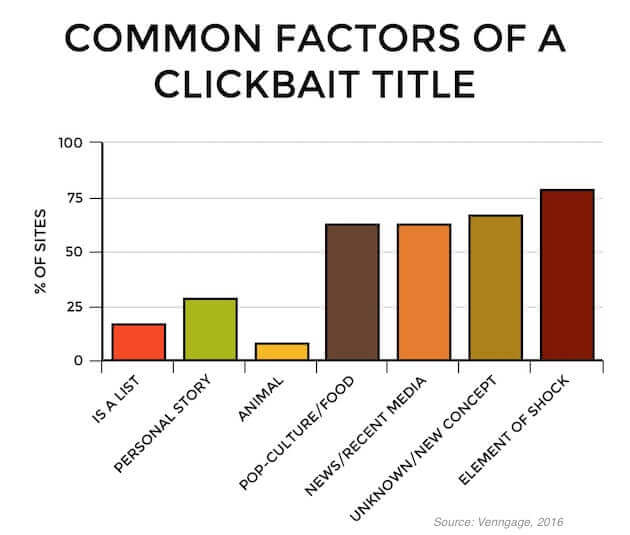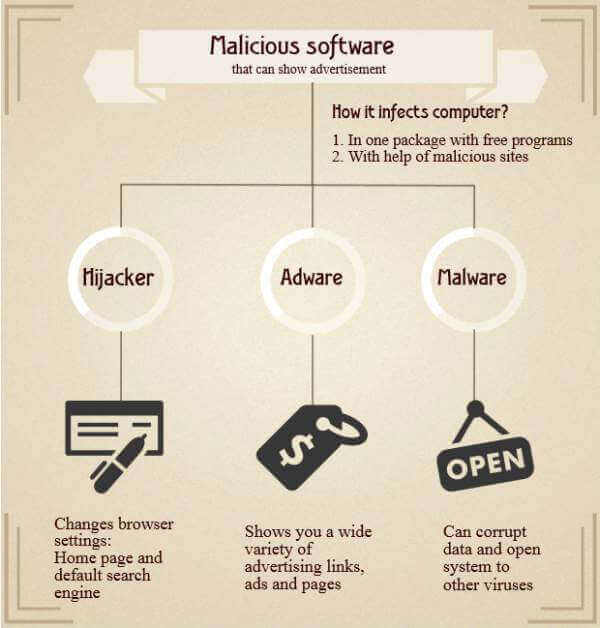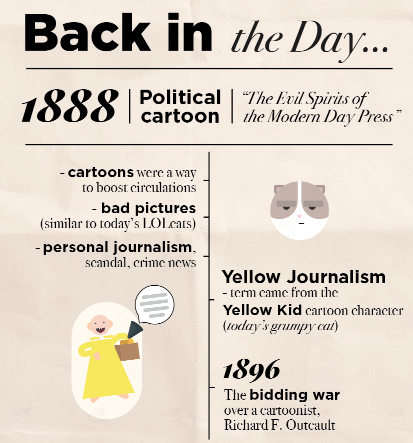Have you ever read something online that starts with, “You’ll NEVER believe …”? If so, you’ve been subject to clickbait. Simply put, clickbait entices its viewers to click. It piques their interest with a catchy photo or caption that seems too good to pass up. Most the time, clickbait is pretty harmless but sometimes it is intentional disinformation and over the past couple of years there’s been a huge surge in malicious clickbait.
Sometimes, clickbait leads to a website that’s riddled with adware, also known as Advertising Supported Software. If you accidentally install adware onto your computer, you’ll probably start to see unwanted banner advertisements. Adware’s main job is to collect information about you to show you catered advertisements.
Generally, adware is more annoying than harmful. That being said, there is a special type of adware called spyware, which is malicious and privacy-invasive. Spyware collects information from you that can be used for illegal activities. For example, a spyware program might capture your bank account information so a criminal can transfer money out of your bank account. In addition to collecting personal information, spyware can corrupt your computer and the files on it.
If you use the internet, you’re going to run into clickbait. It’s all too easy to fall for a claim that over-promises and under-delivers. Most times, this mistake isn’t so harmful, it just wastes your time. However, if you start to click on more and more links, you’ll subject yourself to malicious software that could waste your time and put you at risk.
Below, four things you must know about clickbait are presented. It’s important to read about clickbait and understand its relation to adware and spyware so you can keep yourself safe.
You’re at Risk
It’s all too common for internet users to accept clickbait. Content with simple language that makes you curious is hard to pass up on. In addition to creating curiosity, a lot of clickbait stirs up emotions. Interestingly enough, people are far more likely to click on headlines that speak to the emotions happiness and outrage .
Polarizing content is often pretty interesting. People will click on extreme headlines, even if they infuriate them and don’t represent their point of view. Similarly, you’re more likely to click on videos of cute puppies because they play to the emotion of happiness.
After the clickbait attracts your attention, it encourages you to click on a particular link. This is where things can get complicated. Sometimes the website clickbait leads you to is a pretty harmless site. Sure, it may convince you to download pesky adware onto your computer, but that’s more of an inconvenience than a threat.
In fact, without even knowing it, you might have adware on your computer right now. Do banner ads ever pop up when you’re trying to search the web? Have your online search attempts ever been redirected? If so, your computer might already be infected with adware. Luckily, My Fast PC can help you identify adware on your computer and remove it accordingly.
If you’ve fallen prey to spyware, the issue is a bit more serious. The first sign you’ve been infected with spyware is a noticeable reduction in your computer’s speed and/or battery life. Whether you have these symptoms or not, you should work with a company or invest in an antivirus software that can scan your computer. The longer this program is on your computer, the more damage it can do. It’s critical to catch it early on and run routine scans so you can keep your computer clean.
Where You’ll Find It
Clickbait is everywhere on the internet because it’s useful in a variety of situations. It’s hard for people to ignore catchy and provocative headlines and companies know this. When you see a title that entices you to click to continue reading, you’re probably looking at clickbait. Typically, this type of content will forward you to a site that requires payment, registration or even offers free software.
Generally, there’s not much harm in clicking on these types of links. The real trouble comes when you get to a form that wants you to pay, register or download software to your computer. If the site is corrupt and you enter your credit card information into it, they will probably exploit your bank information. The registration process will likely ask over-personal questions that give online criminals useful information about you that they can use for criminal activities.
A free software offer is one of the trickiest ways people try to get adware and spyware onto your computer. Often, when a clickbait title leads you to a site, and it’ll say that you need to update or download a program to view the content. Many sites will claim that your Adobe Flash Player, a free software that helps you view multimedia, needs to be updated. So, you download their offering, but it turns out that it’s not Adobe Flash Player. It is an adware or spyware program that runs in the background and collects information about you without your knowledge or consent.
To be safe, you should never download software from a link without verifying it first. Any site that claims you need to download something or give information to keep reading should be met with skepticism. If you’re told to download something, see if you can find the original source. Instead of downloading Adobe Flash Player from a clickbait link, go to Adobe’s main website to download it directly. You might even find that you don’t need to update the software, after all.
A Brief History
Clickbait came into popularity over a century ago. Sensationalized journalism was used to propel the United States into war with Spain. News outlet would create dramatic events and stories to sell newspapers and influence the public. This style of writing became known as yellow journalism which has persevered to modern times. The internet is full of clickbait links that favor sensationalism over fact.
Over a decade ago, software developers ran into an issue. They needed a way to cover the cost of making free software. So, they bundled their free software with adware. When a user would request a free software, they’d also get adware that would hijack their computer and bombard them with ads. Next, a form of adware named spyware was released. This program is also bundled with free software, but it’s a lot more harmful than adware. This malicious software has been known to track internet history, steal contacts and use bank account information fraudulently.
How to Evaluate Clickbait
To evaluate clickbait, use the acronym CRAAPP. First, think about currency. Is the headline pertinent to what’s going on in the world? Is it old information that’s being updated to draw in readers? Next, think about its relevance. What information will the source provide you with? Is it geared towards your demographic? Will hit help you better understand the world or provide genuine entertainment?
Authority is one of the most important factors to consider. Always scan clickbait to see who it’s coming from. Then, figure out if they have a strong reputation. While looking at the headline, also determine if it seems accurate. One red flag is clickbait that has spelling mistakes or grammatical errors. You may also want to see if the information is fact or an opinion when you try to determine its accuracy.
Think about its purpose, too. Why was this title created? Clickbait generally doesn’t exist to inform or educate. It is designed to receive a lot of clicks. Finally, think about the process. How much went into the composition of the clickbait? Does it tell you what the article will be about, or does it exclude information to draw you in?
If a clickbait title doesn’t pass the “CRAAPP” test, you have the right to be suspect. You can still click on it, but be very careful about your following activities. You want to avoid giving out your personal information and downloading software when you’re on a clickbait site.
Taking a Stand
Clickbait can be a nuisance, and big-name companies are taking notice. Facebook and Google recently declared that they’re trying to reduce the amount of clickbait on their platforms. They want the content found on their sites to be useful and true. This is a proactive step, but it’s not enough to keep internet users safe.
To have a healthy online experience, individuals must know how to evaluate clickbait, web sources and online tools. The information and evaluation criteria above represent a good place to start. After you follow the advice in this article, you can work to further your digital literacy. The more you practice, the more you’ll be able to spot suspect websites and dangerous online materials. You’ll also be able to do things like verify information or statistics that are presented in clickbait articles for accurateness.
Online literacy doesn’t happen overnight, but you can start on the path today. With the right know-how, you’ll be empowered to keep your computer adware and spyware free. Also, if you need help with the process, you don’t have to go it alone- HelpCloud can help.




